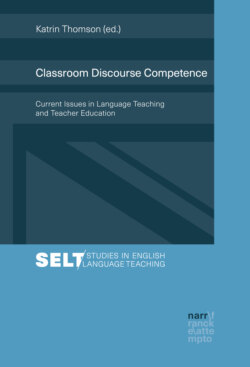Читать книгу Classroom Discourse Competence - Группа авторов - Страница 5
На сайте Литреса книга снята с продажи.
1 Introduction: Volume Rationale
ОглавлениеThis volume moves (E)FL teachers’ classroom discourse competence (CDC) center stage and emphasizes CDC’s vital importance to effective foreign language teaching and, consequently, to successful L2 student learning. Classroom discourse, classroom interaction and classroom communication have been in the focus of researchers for many decades (cf. Walsh 2011: 1), with much of the work having come from (Applied) Linguistics. One of the main objectives of this volume is to further the scholarly discussion on classroom discourse and foreign language teacher education, which entails a marked shift of focus from learner to teacher competences. That is to say that in contrast to existing concepts (such as Galaczi/Taylor’s (2018) interactional competence, Johnson’s (1995) classroom communicative competence or Walsh’s (e.g. 2011, 2012, 2013, 2014) classroom interactional competence), classroom discourse competence clearly and solely denotes a competence of foreign language teachers – not learners.
Broadly speaking, language teachers, who have developed CDC, are able to structure and organize classroom discourse through professional use of the L2 (and other languages) in FL teaching and learning contexts. Language teachers’ (verbal) actions and classroom discourse tasks (including those in classroom management), then, are carried out purposefully and in ways that promote student learning. Moreover, teachers’ discoursal practices manifest themselves in classroom context-adapted decision-making, which – among other factors – is based on profound professional knowledge, pedagogic reflections and classroom discourse awareness. This (here only roughly mapped out) understanding of CDC1 rests on the premise that the quality of teacher talk in foreign language classroom discourse is of paramount importance for learners’ FL competence and achievement gains (Thomson 2020a). Teachers’ CDC, thus, goes far beyond the mere notion of L2 proficiency, communicative or interactional competence, as it always entails a pedagogical, professional dimension (cf. Widdowson 2002, Hallet 2006). It is apparent that a core competence like CDC requires theoretical conceptualization as well as systematic development in initial language teacher education. This volume seeks to tackle these issues, but by no means intends to be exhaustive.
Any volume that conceptualizes classroom discourse competence as a professional competence of language teachers is, of course, informed by the large body of international scholarly literature and research on foreign language teaching and learning, second language acquisition, classroom discourse, conversation analysis, language teacher education and other related areas. Tapping into these international perspectives as well, this volume however primarily focuses on the context-specific situation in Germany. Within this national context, language teachers’ professional competences in general have increasingly come into the focus of policy makers, researchers and teacher educators in recent years. This, however, does not necessarily hold true to the same extent for teachers’ professional L2 classroom discourse competences which, so far, have only played a marginal role in pre-service foreign language teacher education – and beyond (cf. García 2017).
